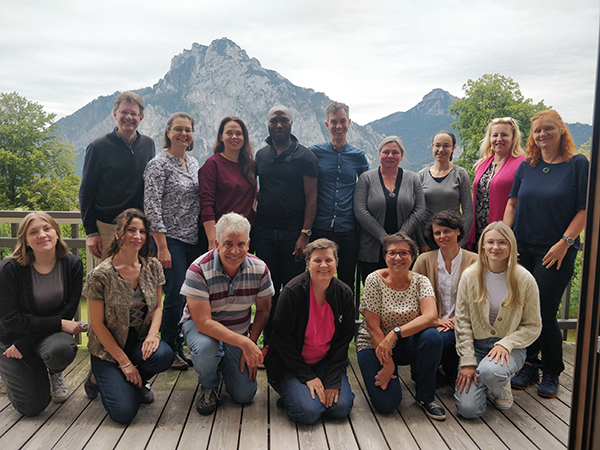
5th Meeting of the EPPO Panel on Diagnostics in Mycology
Traunkirchen, Austria, 2022-09-07/09
The EPPO Panel on Diagnostics in Mycology was hosted by the Federal Research and Training Centre for Forests, Natural Hazards and Landscape in Traunkirchen, Austria. The meeting was organized back-to-back with the European Mycology Network (EMN) meeting. 15 Panel members and 5 observers attended the meeting.

Revised EPPO Diagnostic Protocols reviewed during the meeting
The Panel reviewed 5 revised Diagnostic Protocols.
PM 7/001 Bretziella fagacearum
A revised version of the Diagnostic Protocol prepared by an expert from Fera (GB) was presented to the Panel. The Panel reviewed the main text, the appendices, and the flow diagram of the draft revision. In particular, the Panel discussed the use of molecular tests for the detection and identification of B. fagacearum. A new version that takes into account the discussion of the Panel will be prepared by the Steward and the EPPO Secretariat and sent for country consultation.
PM 7/045 Cryphonectria parasitica
A revised version of the Diagnostic Protocol prepared by a drafting team composed of experts from the Walloon Agricultural Research Centre (BE), WSL (CH), INRAE (FR), UNITUS (IT) and Fera (GB) was presented to the Panel. The Panel reviewed the main text, the appendices, and the flow diagram of the draft revision. In particular, the Panel discussed the difference between detection and identification and whether the morphological observation of mycelial fans and of colonies is sufficient to conclude that the pest has been identified. A new version that takes into account the discussion of the Panel will be prepared by the EPPO Secretariat and sent for country consultation.
PM 7/066 Phytophthora ramorum
A revised version of the Diagnostic Protocol prepared by a drafting team composed of experts from the Walloon Agricultural Research Centre (BE) and Fera (GB) was presented to the Panel. The Panel reviewed the main text, the appendices, and the flow diagram of the draft revision. In particular, the Panel discussed the reorganisation of the section on detection, the need of cutting up leaves for baiting in water and the need for validation data for some of the molecular tests. A new version that takes into account the discussion of the Panel will be prepared by the drafting team and the EPPO Secretariat and will be reviewed by the Panel before it is sent for country consultation.
PM 7/93 Melampsora medusae
A revised version of the Diagnostic Protocol prepared by an expert from the Walloon Agricultural Research Centre (BE) was presented to the Panel. The Panel reviewed the main text, the appendices, and the flow diagram of the draft revision. In particular, the Panel discussed the addition of one synonym and the distinction between wild and cultivated poplar for the identification of the forma speciales. A new version that takes into account the discussion of the Panel will be prepared by the Steward and the EPPO Secretariat and will be reviewed by the Panel before it is sent for country consultation.
PM 7/90 Anisogramma anomala
A revised version of the Diagnostic Protocol prepared by an expert from ILVO (BE) was presented to the Panel. The Panel reviewed the main text, the appendices, and the flow diagram of the draft revision. A new version that takes into account the discussion of the Panel will be prepared by the Steward and the EPPO Secretariat before it is sent for country consultation.
Other revised protocols discussed
The EPPO Secretariat updated the Panel on the progress made on the three following protocols:
- PM 7/014 Ceratocystis platani: an addendum to the protocol will be prepared with an expert from CREA (IT) to include new validation data.
- PM 7/026 Phytophthora cinnamomi: the drafting team composed of experts from MOAG (IL), Forest research (GB), CREA (IT), Mendel University (CZ) is working on the revision of the protocol. A first draft will be prepared by the end of 2022.
- PM 7/016 Fusarium oxysporum f. sp. albedinis: the drafting team composed of experts from MOAG (IL) and Lab2A (MA) is working on the revision of the protocol. A first draft will be prepared by the end of 2022.
New EPPO Diagnostic Protocols reviewed during the meeting
The Panel reviewed one new Diagnostic Protocol.
Stagonosporopsis chrysanthemi
A draft of the Diagnostic Protocol prepared by an expert from JKI (DE) was presented to the Panel. The Panel reviewed the main text, the appendices and the flow diagram of the draft Diagnostic Protocol. In particular, the Panel discussed the possibility to use the conventional PCR from Vaghefi et al., 2016 on plant material, the possibility to test asymptomatic material, the reliability of morphological identification and the use of barcoding for molecular identification of the pest. A new version that takes into account the discussion of the Panel will be prepared by the Steward and the EPPO Secretariat before it is sent for country consultation.
Plans for future new diagnostic protocols
The revision of 3 Diagnostic Protocols (PM 7/017 Phyllosticta citricarpa, PM 7/028 Synchytrium endobioticum, PM 7/046 Lecanosticta acicola, Dothistroma septosporum and Dothistroma pini) will be started in 2023. New Diagnostic Protocols will be prepared on Phytophthora fragariae var. fragariae and Phytophthora fragariae var. rubi and on Neocosmospora euwallaceae.
Other topics
Euphresco
Three ongoing Euphresco projects were presented on:
- Seed-borne pathogens of conifers
- Molecular characterization of potato wart disease
- Early detection of Phytophthora in EU and third country nurseries and traded plants
EFSA EPPO Collaboration
A presentation was made on EFSA activities on pest surveillance and the data needed to optimize the design of surveys (in particular in terms of collecting data on diagnostic sensitivity). It was agreed that EPPO and EFSA would continue to collaborate on this topic and involve EPPO Panels.
Next Panel meeting
The next meeting of the Panel on Diagnostics in Mycology will be held in Autumn 2023.
Participants
The composition of the EPPO Panel on Diagnostics in Mycology can be found on the EPPO website.
